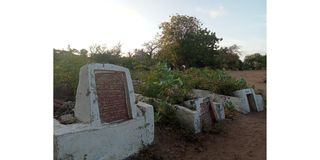Lamu residents protest grabbing of centuries-old cemetery land

Some of the graves inside Mkomani cemetery in Lamu Tiown
A cemetery believed to be over 700 years old in Lamu Old Town is at risk of being grabbed by private developers.
The 10-acre Mkomani cemetery in Wiyoni was initially a graveyard for the family of Maalim Ahmed Bin Ali, well known as Ramadan, who later gifted it to the Lamu Muslim community to bury their dead.
The cemetery is managed by community members, including Said Ahmed Kirume, Mohamed Said, Khuzema Mohamed Abderehman, Abu Athman Changu, Ahmed Sagaf, and Abdullatif Bwanamkuu.
Encroachers have built permanent and semi-permanent structures on the cemetery land. On Wednesday, Nation.Africa saw bushes being cleared to prepare a site for construction.
Mr Kirume, the cemetery supervisor and administrator, said several acres of the cemetery land had already been grabbed.
He appealed to county officials and area leaders to help repossess the stolen land and build a perimeter wall around the cemetery to protect it from the grabbers.
“As you can see, people are determined to continue encroaching on this cemetery land. They are undeterred. They have already encroached on over two acres,” he said.

The Mkomani Cemetery gate in Wiyoni area in Lamu Old Town. The over 700-year-old cemetery is under threat of being grabbed by private developers.
“Our forefathers were buried here. This is also the only cemetery that still has enough space to bury the dead in Lamu Town. We will miss space if these encroachers continue to build their structures here.”
He added that encroachers have taken advantage of the fact that part of the cemetery land has no title deed.
Mr Changu, who is on the Mkomani cemetery committee, expressed disappointment that people who live next to the cemetery were among those trying to encroach on it.
“These residents have built houses with windows facing the cemetery. They have even turned the open space into a passageway. Something needs to be done urgently to protect and preserve this centuries-old graveyard,” said Mr Changu.
Cemetery committee members had expressed their concerns about encroachment to the relevant authorities but no action had been taken, according to Mr Said.
He accused some local politicians of being behind the land grabbing.
“These encroachers are mostly local residents. The courage that they have is a clear indication that some political leaders are inciting them,” he said.
“The committee has started building a perimeter wall to secure the cemetery land. I call on Governor Fahim Twaha, our MPs, woman representative, senator, and MCAs to help us on this.”
Asked why the centuries-old cemetery has not been declared a national heritage site, National Museums of Kenya officials said the required verification about its history had not been carried out.
“I can’t deny the probability that the Mkomani cemetery in Wiyoni is one of the oldest graveyards that have existed here for centuries,” said Lamu Museums cultural historian Mohamed Ali.
“We need time to involve archeologists to undertake carbon dating. If all this is verified, then it can be considered one of the national monuments found here.”





